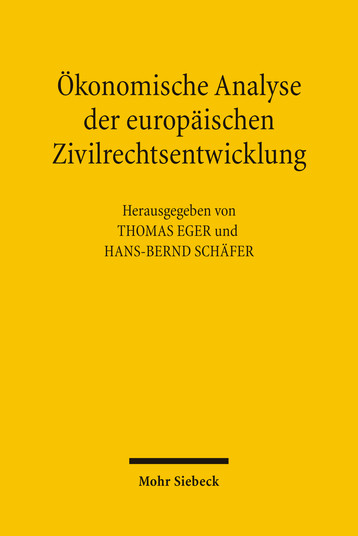Law
Ökonomische Analyse der europäischen Zivilrechtsentwicklung
Beiträge zum X. Travemünder Symposium zur ökonomischen Analyse des Rechts (29. März bis 1. April 2006)
Hrsg. v. Thomas Eger u. Hans-Bernd Schäfer
[An Economic Analysis of the Development of European Civil Law. Contributions to the 10th Travemünde Symposium on the Economic Analysis of the Law.]
2007. XI, 697 pages.
179,00 €
including VAT
including VAT
sewn paper
ISBN 978-3-16-149286-0
available
Published in German.
Since the mid 1980s, the European Commission and the European Parliament have introduced a series of initiatives in order to reverse existing territorial fragmentation of civil law through a greater convergence or even harmonization of the most important private law norms of the member states. These should ideally culminate in a »Europeanization« of civil law. This is the basis for the current law and economics debate, to which this conference is dedicated. The debate focuses on the question of whether or not a harmonization of the civil law norms of the member states is really necessary or even suitable in order to achieve free movement of goods, services, persons and capital within the European Union or to give the European consumer adequate protection.Survey of contents
Dieter Schmidtchen: Vereinheitlichung des Vertragsrechts in Europa – eine Lösung auf der Suche nach dem Problem? Die Sicht der Neuen Institutionenökonomik – Filippo Ranieri: Kommentar: Vereinheitlichung des Vertragsrechts in Europa. Wirtschaftspolitisches Projekt oder rechtskulturelle Herausforderung? Nils Jansen: Traditionsbegründung im europäischen Privatrecht. Zum Projekt eines »Gemeinsamen Referenzrahmens« – Roger Van den Bergh: Kommentar: Der Gemeinsame Referenzrahmen: Abschied von der Harmonisierung des Vertragsrechts? – Andreas Schwartze: Europäisierung des Zivilrechts durch »soft law«. Zu den Wirkungen von Restatements, Principles, Modellgesetzen und anderen nicht verbindlichen Instrumenten – Peter Weise: Kommentar: Soft und hard law – Eva-Maria Kieninger: Aktuelle Entwicklungen des Wettbewerbs der Gesellschaftsrechte – Wolfgang Kerber: Kommentar – Thomas Apolte: Wettbewerb versus Harmonisierung im Verbraucherschutz – Henning Curti: Kommentar: Wettbewerb im Verbraucherschutz? – Bruno Deffains und Dominique Demougin: Das doppelte Holdup-Problem und der Wettbewerb der Rechtssysteme – Christian Seidl: Kommentar – Markus Rehberg: Der staatliche Umgang mit Information. Das europäische Informationsmodell im Lichte von Behavioral Economics – Gerald Spindler und Lars Klöhn: Kommentar – Roland Kirstein und Hans-Bernd Schäfer: Erzeugt der Europäische Verbraucherschutz Marktversagen? Eine informationsökonomische und empirische Analyse – Peter Mankowski: Kommentar: Erzeugt das Verbrauchsgüterkaufrecht Marktversagen? – Stefan Grundmann und Andreas Hoerning: Leistungsstörungsmodelle im Lichte der ökonomischen Theorie: nationales, europäisches und internationales Recht – Urs Schweizer: Kommentar: Leistungsstörungsmodelle im Europäischen und Internationalen Vergleich – Georg von Wangenheim und Sylvia Rückebeil: Die unterschiedlichen Grundlagen von deutschem AGB-Recht und europäischer Klauselvertragsrichtlinie: ökonomische und rechtliche Überlegungen zu Systembrüchen in der Umsetzung von Europäischem Recht – Christian Kirchner: Kommentar – Guiseppe Dari-Mattiacci und Hans-Bernd Schäfer: Kernfragen reiner Vermögensschäden – Jochen Bigus und Ruth-Caroline Zimmermann: Unabhängigkeit und Regulierung von Abschlussprüfern. Neuere Entwicklungen in den USA, Europa und in Deutschland – Florian Faust: Kommentar – Gerhard Wagner: Schadensersatz bei Kartelldelikten – Thomas Eger: Kommentar
